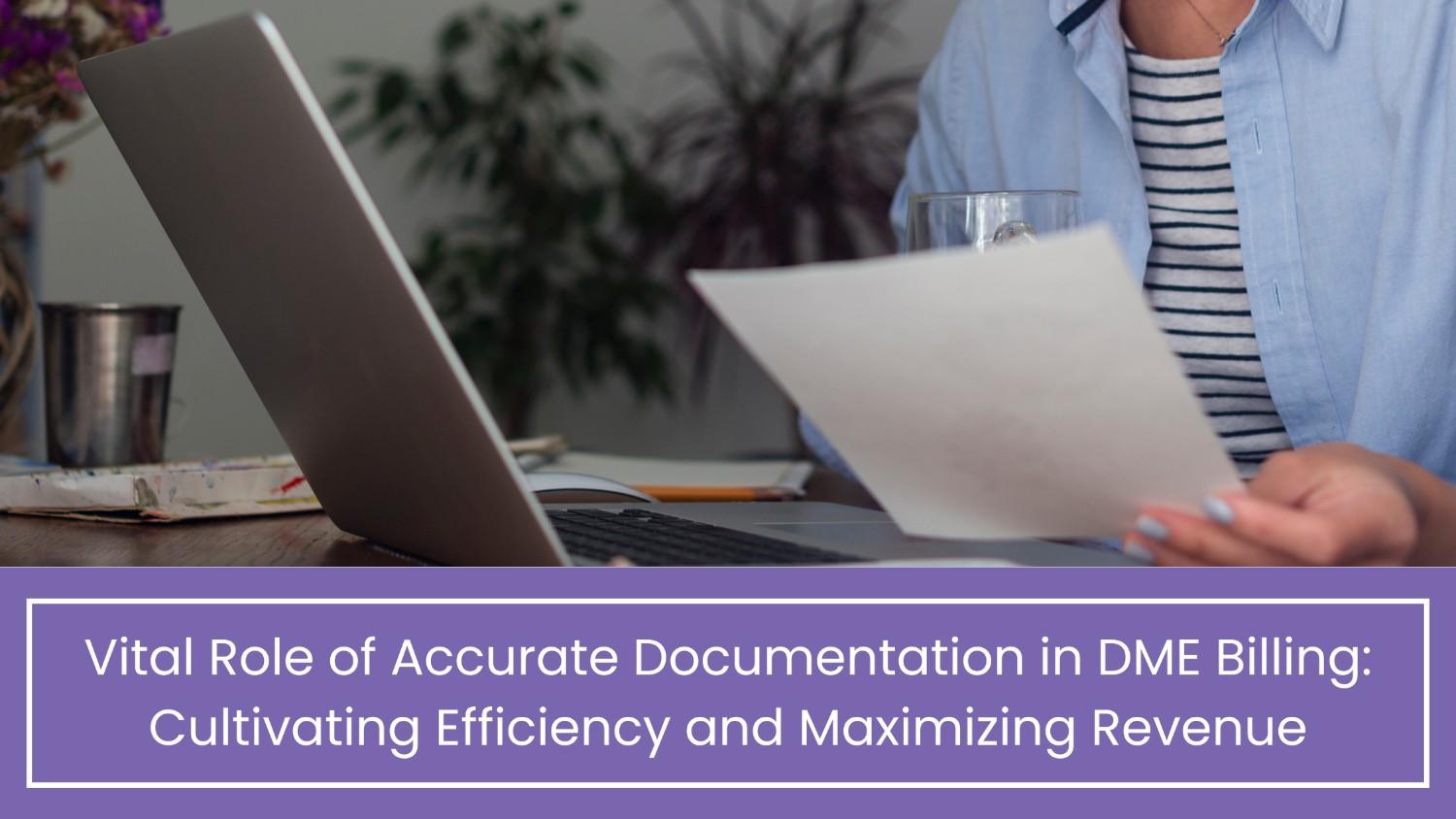Vital Role of Accurate Documentation in DME Billing: Cultivating Efficiency and Maximizing Revenue
In healthcare, effective management of Durable Medical Equipment (DME) billing is vital for medical practices to thrive. Accurate documentation plays a significant role in ensuring seamless reimbursement processes, compliance with regulations, and overall financial health. In this comprehensive blog, we will look into the importance of accurate documentation in DME billing and explore the viable option of outsourcing, offering healthcare professionals insights into optimizing their revenue cycles.
Table of Contents
Fundamentals of DME Billing
DME billing is the systematic process of seeking reimbursement for providing patients with durable medical equipment, prosthetics, orthotics, and related supplies. Precise documentation plays a pivotal role in this process, significantly affecting the entire revenue cycle and shaping the financial well-being of healthcare practices. Thorough documentation of every step of DME medical billing not only guarantees proper reimbursement but also enhances the overall efficiency and credibility of healthcare practices.
Significance of Accurate Documentation in DME Billing
1. Regulatory Compliance
Accurate documentation is crucial for medical facilities to meet strict regulatory requirements. The CMS (Centers for Medicare and Medicaid Services) and other regulatory organizations require detailed documentation to ensure that DME services are medically necessary and meet specific requirements. Failing to adhere to these guidelines could result in claim rejections, penalties, or even legal consequences.
2. Reimbursement Optimization
Accurate documentation directly impacts reimbursement rates. Clear, comprehensive documentation enables healthcare professionals to justify the necessity of DME, supporting their claims for reimbursement. Inaccuracies or missing information in documentation can lead to delays in payment processing and, in some cases, reimbursement denials.
3. Enhancing Patient Care
Accurate documentation not only facilitates billing processes but also contributes to improved patient care. It provides a detailed record of the DME prescription, aiding in continuity of care and ensuring that subsequent healthcare providers have access to essential information. This comprehensive documentation also supports better communication among healthcare professionals, ultimately benefiting the patient.
4. Reducing Audit Risks:
Thorough documentation serves as a shield against audits by payers and regulatory bodies. In an environment where audits are becoming increasingly common, accurate documentation can be the key to proving compliance and avoiding financial penalties. Healthcare practices with well-documented DME services are better prepared to navigate audits seamlessly.
Best Practices for Accurate Documentation in DME Billing
1. Detailed Patient Information: Begin by capturing comprehensive patient information, including demographics, medical history, and any relevant insurance details. This forms the foundation for accurate billing.
2. Specificity in DME Descriptions: Clearly document the details of the durable medical equipment provided, including brand, model, size, and any additional features. This specificity is vital for accurate DME coding and billing.
3. Prescriptions and Orders: Ensure that all DME delivery are accompanied by valid prescriptions or orders from authorized healthcare providers. This not only meets regulatory requirements but also serves as evidence of medical necessity.
4. Date and Time Stamps: Incorporate date and time stamps in documentation to establish the timeline of DME delivery. This helps in verifying the chronological sequence of events and can be crucial in case of audits or disputes.
5. Consistency in Coding: Align documentation with appropriate medical codes, such as Healthcare Common Procedure Coding System (HCPCS) codes, to ensure consistency between the provided services and the billed amounts.
6. Regular Training and Education: Keep healthcare staff updated on the latest documentation requirements, DME coding changes, and regulatory updates through regular training sessions. This ensures that the entire team is well-informed and follows best practices.
7. Utilize Technology: Implement electronic health records (EHR) and billing software to streamline documentation processes. These tools not only enhance accuracy but also improve efficiency in managing DME billing.
Challenges in DME Documentation and Solutions
Despite the importance of accurate documentation in DME medical billing, healthcare professionals often face challenges in maintaining consistency and precision. Some common challenges include:
1. Incomplete Documentation: Address this challenge by implementing comprehensive documentation templates that prompt healthcare providers to include all necessary information for DME billing.
2. Addressing Lack of Standardization: To ensure uniformity and reduce the risk of errors, it’s important to standardize documentation practices across the healthcare practice. This can be achieved through implementing clear guidelines and conducting regular training sessions.
3. Insufficient Training: Invest in continuous education for medical personnel to keep them up to date on the most recent documentation requirements as well as best practices. This guarantees that staff members have the knowledge and skills required for accurate DME billing.
4. Technology Integration Issues: Choose and implement EHR and billing software solutions that seamlessly integrate with existing workflows. Provide comprehensive training to healthcare professionals to ensure proficient and effective use of these tools.
Challenges of In-House DME Billing
1. Time-Consuming Processes:
In-house DME billing can be time-consuming, requiring healthcare professionals and staff to dedicate significant resources to administrative tasks. The time spent on billing activities could be better utilized for patient care and other vital aspects of running a healthcare practice.
2. Expertise and Training:
The intricacies of DME billing demand specialized knowledge and continuous training. Keeping staff updated on the evolving regulations and DME coding requirements can be a daunting task for healthcare practices. Inaccuracies stemming from insufficient expertise can lead to claim denials and revenue loss.
3. Technology Investment:
Efficient DME billing necessitates a strong technology infrastructure, which includes billing software, compliance tools, as well as secure data storage. The financial burden of buying and maintaining such equipment can be prohibitively expensive for smaller practices, redirecting resources away from essential healthcare services.
4. Staff Turnover:
High turnover rates in healthcare practices can disrupt the continuity of DME billing processes. Training new staff, ensuring they are up-to-date with regulatory changes, and maintaining consistency in documentation practices become challenging when faced with frequent turnover.
Streamlining DME Billing Through Outsourcing for Accurate Documentation
Outsourcing Durable Medical Equipment (DME) billing services has become a strategic choice for healthcare providers aiming to enhance accuracy in documentation. By entrusting billing processes to specialized service providers, healthcare institutions can leverage the expertise of professionals well-versed in the complex landscape of medical coding and billing regulations. This not only ensures precise documentation but also facilitates compliance with ever-evolving healthcare standards, ultimately leading to improved reimbursement rates and reduced instances of claim denials.
Outsourcing DME medical billing allows medical facilities to concentrate on core patient care while benefiting from devoted billing professionals. DME Outsourcing partners’ simplified operations and meticulous attention to detail, help to improve billing workflow efficiency, resulting in more accurate documentation as well as quicker reimbursement cycles. As the healthcare industry evolves, outsourcing DME billing emerges as an attractive choice for providers looking for a dependable and cost-effective way to navigate the complexities of medical billing while ensuring comprehensive and precise documentation.
Recognizing the crucial role that accurate documentation plays in DME billing, Practolytics is proud to be a trusted Revenue Cycle Management (RCM) service provider. At Practolytics, we understand that precise documentation is more than just a regulatory obligation; it is the foundation of financial stability, compliance, and the delivery of high-quality patient care within healthcare practices. Our commitment to excellence aligns seamlessly with the industry’s best practices, allowing us to address the challenges inherent in DME billing.
Practolytics goes beyond conventional RCM services by specializing in DME Billing Services. Leveraging our expertise, we empower healthcare professionals to navigate the complexities of DME medical billing with confidence. By adopting cutting-edge technology and adhering to strict quality standards, we ensure the efficiency and integrity of the entire healthcare system. Partner with Practolytics to experience a comprehensive solution that not only meets regulatory requirements but also contributes to the sustainability of your operations and, ultimately, the well-being of your patients.
ALSO READ – Revenue Cycle Management: Where Financial Success Meets Healthcare in 2024
Talk to Medical Billing Expert Today — Get a Free Demo Now!






